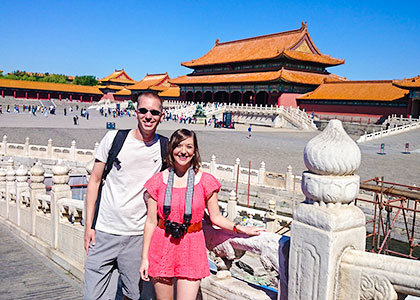1. Get there early. Market vendors will offer better bargains to their first customers if they arrive in the market earlier.
Pro: Buying early will give you more choices and lets you bargain more.
Cons: This requires you to get up early. Not everyone has the time.
2. Bring Cash
The majority of street vendors prefer to accept cash payments, but mobile payment methods like WeChat Pay and Alipay are getting more and more popular.
Benefit: Cash payments can make transactions more smooth and gives you negotiation leverage.
Con: Carrying a large amount of cash can increase the risk of stealing or losing it in crowded places.
3. Learn Basic Mandarin
The most effective method to learn is to master phrases like "Zhegeduoshaoqian?" ("How much is that?") or "Pianyi Yidian Ba" (Can you lower the price?) Communication is the key to effective communication.
Pro: Shows respect for local culture and builds rapport with vendors.
Pro: A limited vocabulary can be a cause of confusion.
4. Be sure to inspect your belongings
Tips: Make sure you inspect all products thoroughly to ensure that there are no flaws and inconsistencies.
Pros: You'll receive exactly what you spend for.
Pro: It is time-consuming and could cause frustration to vendors.
5. Bargain Confidently
Tips: Never be afraid to negotiate, as it's expected in most street markets. Start by reducing the price 50-70%.
Pro: Bargaining offers the potential to drastically reduce costs.
Pro: It may be intimidating for people who aren't experienced with the process.
6. Be wary of counterfeits
Watches, electronics and bags that are branded can be fake.
Pro: It helps save the cost of buying cheap counterfeits.
Con: Genuine products are harder to come by and are more expensive.
7. Local Customs
Tip: Adapt your approach by observing how locals behave shop and negotiate with vendors.
It is possible to avoid cultural blunders by mixing in.
Cons: It could require some time to master the various customs.
8. Keep Valuables Secure
Tips Use anti-theft bags or store your wallets and cell phones in a secure pocket. This will allow you to avoid being robbed in crowded markets.
Reduces the risk of theft in busy areas.
Cons: Additional precautions can feel restrictive and inconvenient.
9. Try before you buy (Food)
Take a look at a sample of dried food or snacks before you buy.
Pro: You'll be happy with the flavor and quality of the food.
Con: After providing you with a sample, some vendors might try to convince you to make an order.
10. Know the market's primary focus
Tip: Each market is unique in specific items, like Shanghai's Yuyuan Market for souvenirs or Beijing's Panjiayuan for antiques. It is possible to research your needs and match them to the market you're going to.
Benefits: You'll cut down on time by focusing your areas of focus.
Cons: It restricts spontaneity in the sense that you must stick to the facts you have researched.
Shop at street markets for their advantages
Unique Finds: There are many items you can find that you can't find in the traditional retail store including handmade products and snacks from the local market.
Street markets are often cheaper than shopping centers or other stores.
Cultural Experience: Engaging in conversations with vendors and exploring local markets is one way to be immersed into the culture of the area.
Markets can be a great source of diverse items including food and clothing to gifts.
Cons of Shopping Street Markets
The likelihood of finding copyright goods is a high likelihood of finding fake or inferior products.
Crowds are an everyday sight, especially during weekends and holidays.
Vendor pressure: Some vendors use aggressive selling tactics that can saturate the experience.
No Returns: The majority of purchases are final, with little recourse for exchanges or refunds.
These tips can assist you in avoiding the most common mistakes and get the most the China's market on the street. Follow the best read more about this incredible site for site advice including hua diao the most famous shaoxing yellow wine, tours for the disabled, ancient football in china cuju in ancient china, entertainment in hong kong, ancient football in china cuju in ancient china, hohhot transportation, tips for identifying copyright, shopping in tibet, chaotianmen dock%EF%BC%8C a major water transportation hub in chongqing, chinese wood carving originated in neolithic period and more.

Top 10 Tips For Visiting Chinese Temples And Avoid Paying Fees
1. Entertainer Fees: Most famous temples charge a fee for entrance, which may vary from Y=20 to Y=200. You can plan your budget when you study the cost of tickets.
Pro: It can help you to stay clear of surprises by assisting to calculate the exact amount of cash for digital transactions or cash.
Con: Unexpected extra expenses, such as special exhibit fees can occur.
2. Bring cash or digital payment
You can only pay in cash at certain temples, or use popular Chinese payment methods like WeChat Pay and Alipay.
Pro: Ensures smooth entry with no payment delays.
Cons: Not many options for foreigners who do not know how to utilize the digital payment app.
3. Look for signs that read "Photography"
You can always check for notices on the walls that say whether or not you're permitted to take pictures. A lot of temples ban photography in temples and in the vicinity of sacred artifacts.
Pro: Stops accidental infringement of rules or breaking.
Cons: Rules can differ from one region to the next within the same temple. You'll need to pay extra attention.
4. Avoid Flash Photography
Even in areas that allow you to take pictures, you should avoid using flash since it could result in damage to artifacts or cause disturbance to worshipers.
Pro: It protects the temple's environment and artwork.
Con: Insufficient lighting can cause less-than-ideal pictures.
5. Respect the privacy and dignity of worshippers
Do not take pictures of people doing religious rituals and praying without permission.
Pro respects space for personal privacy and cultural sensitivity.
Cons: You may not be in a position to capture the entire experience of the temple.
6. Drone restrictions will be in place
Tip. Drones are usually not allowed in temple areas. Make sure you are aware of the local regulations prior to using a drone to take photos from above.
Pros: You will avoid fines and confiscation of drones.
Cons: It limits the possibility of capturing unique angles.
7. Prepare yourself for additional fees
You could be charged an additional fee by some temples for permits to shoot photos, especially when you use professional equipment, such as DSLRs or tripods.
Pro: This ensures that the images are taken in high-quality and legally.
Cons: Added to trip cost
8. Dress Modestly
Be respectful when visiting temples. A dress code that is not appropriate could result in you being denied entry or be restricted in certain areas.
Pro: It shows that you respect the religious setting, and it helps you blend in.
Con: May require extra preparation, especially in hot weather.
9. Avoid taking photos in crowded areas. Photos
Tip Beware of crowds by going early in the morning or later in the afternoon. It is much more straightforward to shoot photos without obstructions.
Pro: Enhances the experience as well as photos.
Con: It requires you to alter your timetable, which might not always be convenient.
10. You may ask permission If You're Uncertain
Ask temple staff and signs about rules when in doubt.
Pro: Reduces the risk of violations of rules.
Con: Language barriers might make communication difficult.
Pros of Following Fees and Rules for Photography
Respect for Culture Affirmation of local customs and religious beliefs.
Artifact Preservation: This helps protect fragile artwork and structures.
Positive Experiences
Legal Compliance: Avoids fines or penalties for breaking photography laws.
Cons of Paying Fees to Photographers Photography
Extra Costs: Fees for entry and photography permits could add up.
Restrictions on Creativity can prevent creating the perfect image.
Language Barriers. Difficulty communicating or understanding local signage.
It takes more time and effort to plan for an investigation project.
You can have a relaxing enjoyable, pleasant, and respectful visit to China's temples by following the rules and regulations. This helps to protect their spiritual and cultural integrity. Take a look at the recommended discover this must-visit location for more examples including xi an travel tips, chinaexpeditiontours.comattractions, shenzhen golf club, guilin travel tips, honey lake country club, popular beijing night markets, popular beijing night markets, eating in zhengzhou, entertainment in beijing, tips for identifying copyright and more.
